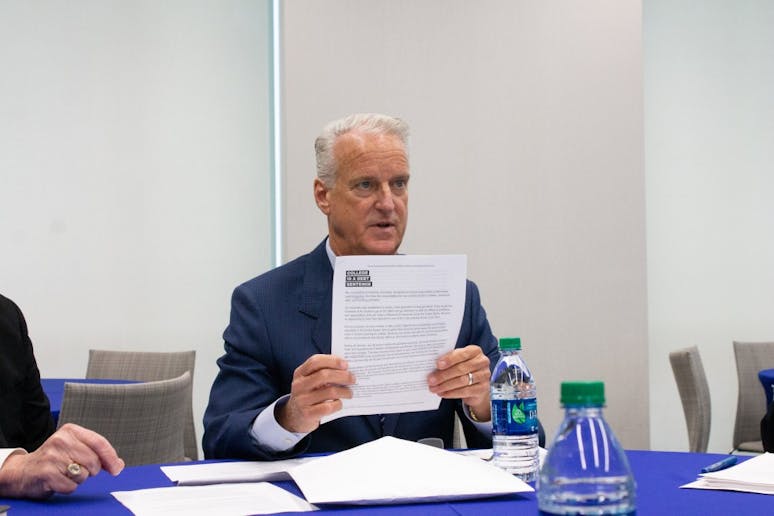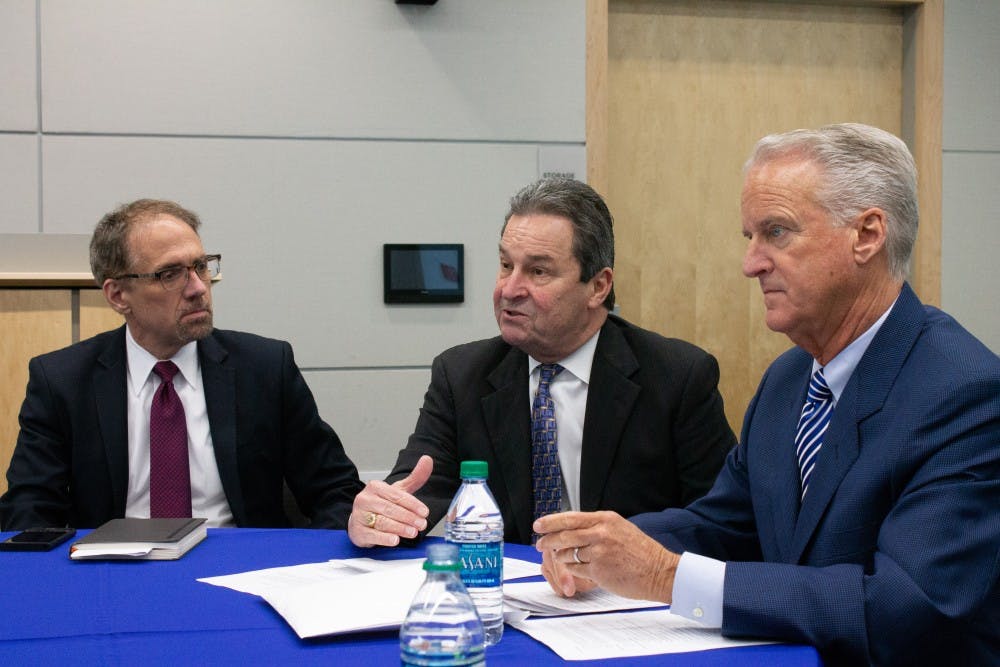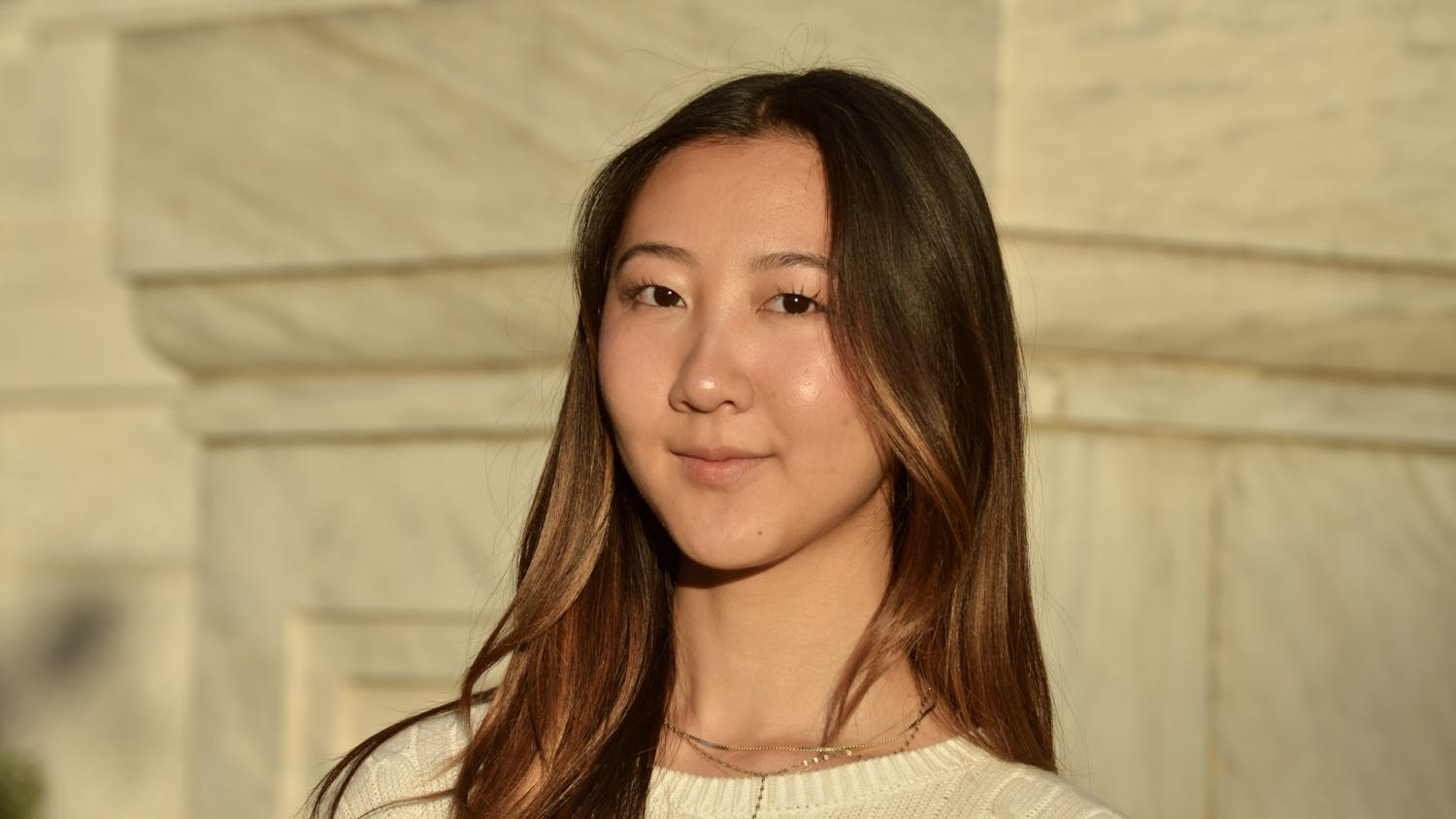Following a student protest over rising tuition and college affordability Thursday, the Board of Trustees voted Friday to increase tuition by 3 percent for both fiscal years 2020 and 2021. The cost of attendance at the University will go up by 2.3 percent in 2020 and 2.4 percent in 2021, according to data provided by the board.
Doug Kudravetz, AU’s chief financial officer, said in an interview that a key theme of this year’s budget process was affordability.
“We’ve kept our tuition increase as low as possible,” Kudravetz said. “The average increase of the other schools that AU students applied to is 3.6 percent, and we’re at 3 percent, so we’re keeping our tuition increase lower than competitors.”
The University’s operating budget for both years will be approximately $1.5 billion, with a budget of $749,000,000 for 2020 and $776,000,000 for 2021.
Although tuition and cost of attendance will increase during these years, the cost for food service will not face a similar price jump following student complaints over proposed price increases for meal plans. But the price for suite-style rooms will increase, board chairman Jack Cassell told The Eagle.
Kudravetz said that almost $10 million will be added to financial aid in 2020. Half of the 3 percent tuition increase goes directly back to financial aid, which will be about $10 million in 2020 and $6.7 million in 2021, he added.

Jack Cassell at the Board of Trustees meeting in March 2019
Board chairman Jack Cassell holds a student-produced action plan about the AU budget after the Board of Trustees meeting on Friday. CAMERON HICKMAN/THE EAGLE
Cassell said that he understands students’ concerns with rising tuition and attended the student protest on Thursday, where he interacted with student demonstrators and answered their questions. He added that the board’s increase was lower than previous years, including 2017, when tuition was increased by 4 percent for both 2018 and 2019.
“We’re as concerned about it as [students] are,” Cassell said. “We’re not paying that bill in the end but we are looking out for their interests. As far as tuition goes, the only lower tuition increase was 2.95 percent and that was seven or eight years ago, so we’re very proud that we were able to do this, and in particular, the piece where we’re giving the half percent of 3 percent back to the students for scholarship.”
Claudia Stephens, a freshman who helped organize the tuition protest Thursday, said she was “not totally satisfied” with the budget results, which she said is significantly higher than the inflation rate of 1.6 percent. But it was an improvement from the previous 4 percent, she said.
“However, our main goal of the protest and what I’m looking for most is increased transparency in the budget reports of where these funds are going,” Stephens said.
Charlie Estes, a first-year student who was also an organizer of the tuition protest, said the vote felt like a “victory” because the three percent hike is 25 percent “less than what we were told was inevitable and unavoidable less than a week ago.”
“Everyone who stood up and showed out to the protest Thursday made this happen,” Estes said. “We were able to have an open and honest conversation with several board members and I truly believe that they heard us.”
In regard to other elements of affordability, the board also focused on reducing course fees and providing stipends for graduate students getting doctoral degrees.
“We eliminated course fees because students said that they chose not to take a course because there was a fee on it, so it restricted what they could take,” Kudravetz said. “We spent about a million dollars to reduce course fees and built that into the budget.”
Kudravetz said that approximately $1 million was included in the budget for graduate students, along with funding for other strategic priorities like student retention, student wellness and mental health resources.
On the expense side, there were health care increases, the costs associated with providing paid family leave due to the D.C. Universal Leave Act and a 2.5 percent merit increase, Cassell said. The merit increase is a pool of money allocated for faculty and staff salary increases based on performance, which accounts for part of the tuition increase, he said.
Since AU is a knowledge-based organization, Kudravetz said, half of the University’s budget consists of salaries and benefits in order to attract the best employees, so AU needs to remain competitive, accounting for the 2.5 percent merit increase.
When constructing the new budget, Cassell said the main priorities of the board included affordability, the future of the new five-year strategic plan set forth by President Sylvia Burwell and funding for the core priorities at AU.
While the new budget will not help to grow AU’s endowment specifically, the budget did build in money for the development office to work on increasing the endowment, Kudravetz said.
“That office will help hire some people and they will work on the comprehensive endowment campaign,” Kudravetz said. “In an indirect way, the budget is building the infrastructure and development office to help with the campaign and fundraising.”
Cassell said the board read and valued recommendations in a 2018 AU Student Government report that analyzed different aspects of the University’s approach to financial aid, including the potential for a tuition freeze, reductions in housing and dining costs and increased endowment spending.
Provost Dan Myers said that although he came into the process late, he was impressed with the quality of student efforts on the budget. Myers started in his position in mid-January.
“I don’t think I’ve ever seen anything that well done and comprehensive in terms of participating in the budget process,” Myers said. “And when the quality is that good, it makes it easy to fold it into the process and into the thinking that we’re doing about the budget. We’re very grateful to the students for their input.”
Estes said students will not stop advocating for more actions to make AU more affordable.
“We need to continue the job we started and hold the board accountable for the promises they made to us — namely, for more transparency in the budget and the salaries and job descriptions of administrative positions,” Estes said. “We are in a place where we can make real change, both here and across the nation.”
Burwell’s influence in the budget process came through in her advocacy for more financial aid, Cassell said, adding that the board is “always looking for ways to help students with more scholarship and aid.”
Overall, Kudravetz said, operating expenses were reduced by 1 percent, saving several million dollars in the budget. However, the board made sure that none of the cuts would affect student services like food or travel.
According to Teresa Flannery, the University’s vice president of communication, the information from the board meeting will be made public within the next month, with a letter from Cassell to be sent out to the AU community at the beginning of next week.
“The transparency and the openness of the community when working on the budget was truly phenomenal,” Kudravetz said. “We’re proud of it and it’s something to be proud of.”
Maria Carrasco and Haley Samsel contributed reporting to this article.





